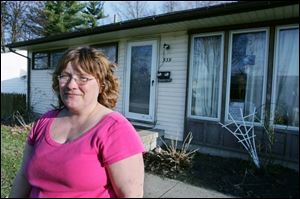
Mold in Toledo house prevents crucial organ transplant
4/10/2008
Bonnie Kalka, who needs a pancreas transplant, was told she can't have one if she returns to her mold-infested house.
Water and sometimes sewage have rushed into the basement at 539 West Crawford Ave. at least eight times since 2006, when flooding from nearby Shantee Creek caused havoc in the West Toledo neighborhood.
Mold has taken hold in the modest one-story house Tim and Bonnie Kalka inherited 14 years ago, and on which they owe more than $40,000.
And that mold is at the root of Mrs. Kalka's inability to get a pancreas transplant at Cleveland Clinic. She said she cannot return to such a house for at least three months after surgery - and doesn't have the money to live elsewhere.
"I can't afford to make payments on the house and live somewhere else," said Mrs. Kalka, 44, a diabetic whose pancreas isn't functioning.
Said Mr. Kalka, who was hospitalized two weeks with pneumonia and other problems after trying to clean up the 2006 flooding: "What we need to do is move, but nobody's going to buy this house."
Toledo is spending $3 million to widen Shantee Creek. The Federal Emergency Management Agency has awarded the city a $390,000 grant to buy six houses, primarily on Crawford, which were damaged during the summer of 2006.
Still, the Kalkas are among city residents with flooding problems who have not gotten relief.
Attorney Phillip Bazzo said yesterday that he plans to refile within a few days an expanded lawsuit against Toledo, Lucas County, and other defendants on behalf of about 100 households affected by flooding.
For the Kalkas, for example, the lawsuit will seek compensation for the value of their house before the 2006 flooding, out-of-pocket expenses, and personal injury damages, Mr. Bazzo said.
Brian Schwartz, spokesman for Mayor Carty Finkbeiner, said Toledo officials are familiar with the family's situation, and Mrs. Kalka has talked to the mayor.
Officials, however, cannot comment on a pending lawsuit without seeing it, he said.
Mrs. Kalka visited Cleveland Clinic in December to be assessed for a pancreas transplant and was told in February she can't have one if she returns to her mold-infested house. She is to go back to the Cleveland Clinic on April 22, when she needs to have another residence lined up, she said.
Transplant surgeon Dr. Venkatesh Krishnamurthi, director of the kidney-pancreas transplant program at Cleveland Clinic, said patients are given medications to suppress their immune systems so they don't reject transplanted organs.
Those medications make transplant patients more susceptible to infections in any environment, so living with mold is very risky, he said.
If she can't receive a transplant, doctors say she must strictly control her blood sugar level to prevent new medical problems.
The Kalka house has mold in the basement, and it also grows on walls upstairs, said Mrs. Kalka, a mother of four who is studying nursing at Owens Community College. One daughter is disabled, and her youngest child has allergies aggravated by the mold, she said.
"We could probably crack open any one of these walls and it would be full of mold," said Mrs. Kalka, a diabetic since she was 11 who has had various health problems.
Mr. Kalka, 49, said their best alternative would be to leave the house, although he hates the thought.
"I grew up here," he said. "But I don't want to go through this anymore."
Contact Julie M. McKinnon at:
jmckinnon@theblade.com
or 419-724-6087.